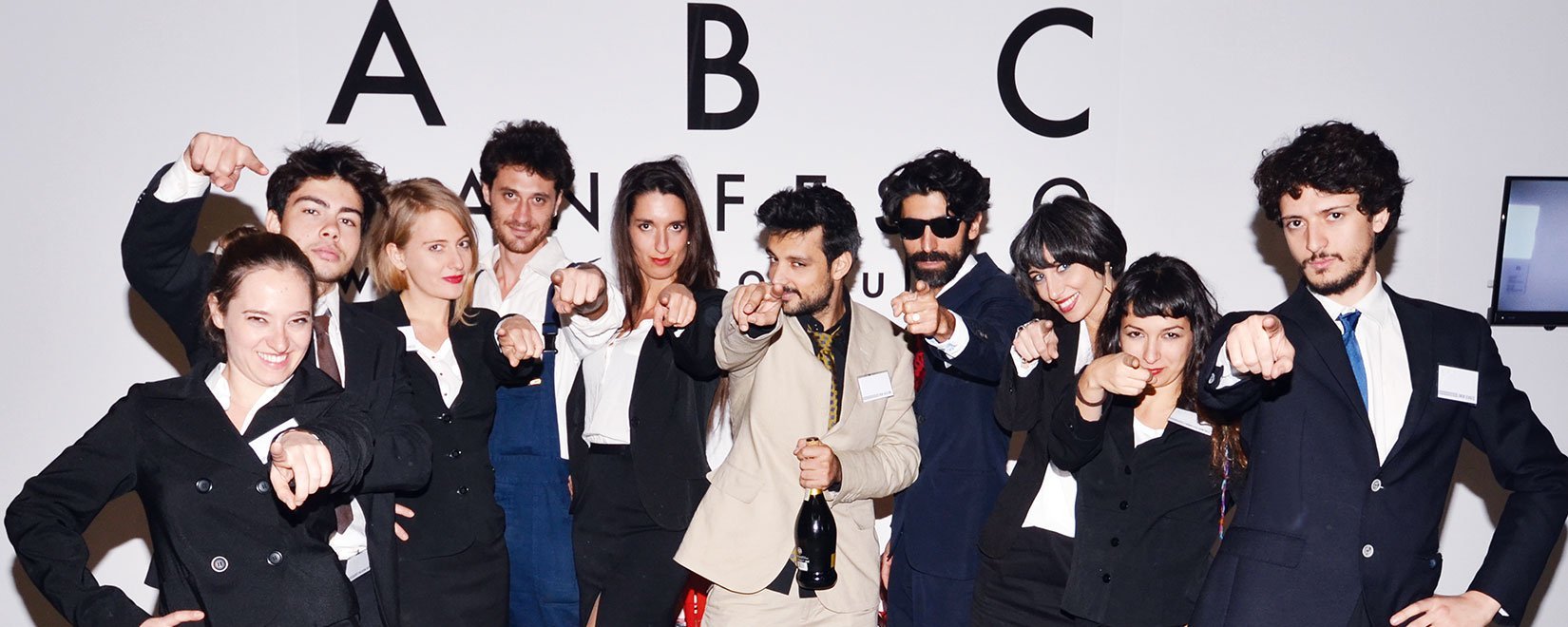The ABC Manifesto is one of the actors of the second Istanbul Design Biennalle, created by the young Italian Collective Suffix ATI. As their general arsenal, Suffix ATI employs a cynical discourse, some acidic humour and a lot of nonsense, all of which are usual suspects of political criticism. Yet, they manage to work around these tools to rewire them in order to provoke creative thinking and political activity. Here is our chat with them about the irrelevancy of manifestos, post-Gezi and creative political struggle.
- - - - - - - - - - - - - - - - - - - - - - - - - - - - - - - - - - - - - - - - - - - - - - - - - - - - - - - - - - - - - - - - - - - - - - - - - - - - - - -
Can you tell us a bit about the team, how did you guys ended up becoming the ABC Manifesto?
“To put out a manifesto you must want: ABC to fulminate against “1, 2, 3”
In 1918, Tristan Zara started its famous Dada Manifesto explaining how irrelevant manifesto were by describing the writing of them as a simple series of rules to be followed. After almost 90 years the irrelevancy of manifestoes is testified by the fact that they became simple communication devices that do not imply the need for self-transformation nor social change.
They are nothing more than a weakened literary genre with rules and codes without any spirit.
Our collective always worked towards a real transformation of social behaviour and therefore we didn’t want to be misconnected with a world of ambiguous wording, all we had to do was to mock something that already doesn’t have much dignity.
Your "headquarters" reside in Istanbul Design Biennial, where you invite people to a process of creating their own manifestos. Can you tell us about this process, what gets involved?
The aim of the installation is simply to show the visitors that manifestoes don’t have any relevance in today’s society. In order to do so we invite visitors [clients] to write a manifesto following a defined path that will enable them to free themselves from a passive visitor role and will eventually transform them into energized individuals capable of performing in front of a camera. After this liberating process every client of the corporation reads aloud the manifesto that he produced and is later constraint to destroy the product of his journey in our offices. The client is left with adrenaline and questions related to the nonsense of the 10 minutes spent with us.
How do you define what a manifesto is?
All the manifestoes that are produced in our installation are highly arbitrary. The texts are connected to the interactions we have with the visitors but they never mean anything. Sometimes they make grammatical sense, most of the time they are simply a funny senseless output of an algorithm.
We are curious: Does ABC Manifesto have a manifesto?
ABC manifesto clearly can’t have any manifesto of its own.
Once the purposelessness of manifesto is acknowledged there is only time for creative destruction.
The closest thing we have to a manifesto is our commitment to change ourself on a project base.
In order to ensure that openness we never use the same collective name. Projects change, the suffix ATI stays.
ABC also has a lot of "investments" regarding various gentrification processes or socio-economical issues regarding Istanbul and Turkey. Everything from creating luxurious perfumes from Fikirtepe's local smells to building a marine area in Arnavutköy. What is your perspective and / or involvement with these investments?
The “real estate group” is our side project for the biennal that will be developed from now to December throughout a series of public antagonising interventions. We are assuming that a methodological change of language is needed in the urban discourse. We are using a cynical approach to question relevant issues of the current city development beyond static political correctness. We are not sure where we will be led to, but it’s worth trying.
For the past 20 years the city has been undergoing insane transformations, nevertheless architects, planners and designers aren’t capable yet of reinventing their practice beyond sterile criticism. Way before Gezi, Sulukule platform was one of the most outstanding worldwide collective process generated by an opposition to the urban development that inspired collectives like ours everywhere in Europe. Now what?
From public interventions to experimental community engagement, antagonistic actions or disturbing installations are needed; young Istanbulites should to acknowledge possible other ways to conceive their practice and to get politically involved.
One of your investments, "Towards a Civic Disengagement" offers "demonstration brokers" who will participate in protests as delegates of the people who hire them. I think this idea speaks to a problem that people around the world have been facing as the police and governments become more and more violent against the citizens who participate in protests. How do we fight the tendency to politically disengage?
We should first say that unfortunately political disengagement is a worldwide common dynamic that goes far beyond police repression. What we see nowadays in this post Gezi year in Turkey, is that repression destroyed the motivation of an entire generation that for the first time was opening itself to the political sphere. The hopes of that incredible heterogeneous mass were tragically crushed while still flowering and were replaced by numb pessimism.
Nevertheless the current hopelessness doesn’t justify the political disengagement either; Gezi attracted the attention of the international media not only because of its criminal and idiotic repression but because, within the struggle, it was perceived as a blossoming creative moment, where the very essence of a protest was reinvented on a daily base. Gezi and the following elections showed that the political system is incapable of change but also opened a path for a new communal spirit. Unfortunately of all that sparkling creativity we see little leftovers.
As a collective we feel the need to highlight that despite the failure of the political objective, Gezi was, and still is, an inspiring moment to rethink the way protests can be reinvented by innovating new strategies to involve new people. Concerning this topic we are planning a surprise with Kontract.
Stay tuned. Soon on ABC investments…..
You also work with / look for local partners to work with you. Why do you think it is important to work with locals?
We use nonsense and provocation as our interactive devices to start up all our projects, but we never see them as an objective on their own. As foreigners it would be too superficial to organize interventions around the city which only last a day. We want local collaborators in order to share the political responsibility of an intervention. We are here now but we won’t stay here forever. It would be too easy and certainly useless to organize a performance that doesn’t acknowledge the consequent counteraction from the neighbourhood. We provoke to induce a reaction from the people we interact with and from the local audience. There simply can’t be any other option than working with locals.
As a final question, what is ahead for ABC Manifesto? What happens after the biennale? Any upcoming new projects?
Unless we get a police notice, we will be coming to Istanbul again after the biennale.
As a young collective we are always eager to experiment new methodologies for our interactions and new topic to be explored.
Our upcoming project is called “Detitto and Decoro” [Decorum and Crime], which is an ongoing research of the past year that explores the removal of all the thresholds in Rome that still allow for interclasses encounters. We strongly believe that the marginal, the exceptional and any expression of non-integration can occur as long as those thresholds are kept. Dumpsters, urinals, traffic lights, phone cabins, etc they all share the nightmare of being removed from the urban scene in order to deny the right to the city to whom would once be called lumpenproletariat.
The removal characterizes any form of urban cleansing aiming at eliminating the very few places of interactions left with city outcasts. For us the war just started. Any threshold is a trench.
For more info check our [ real ] site : atisuffix.net

















